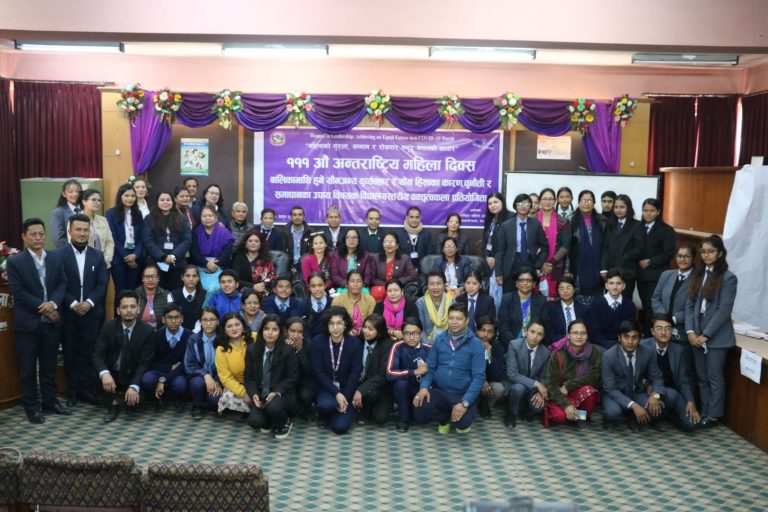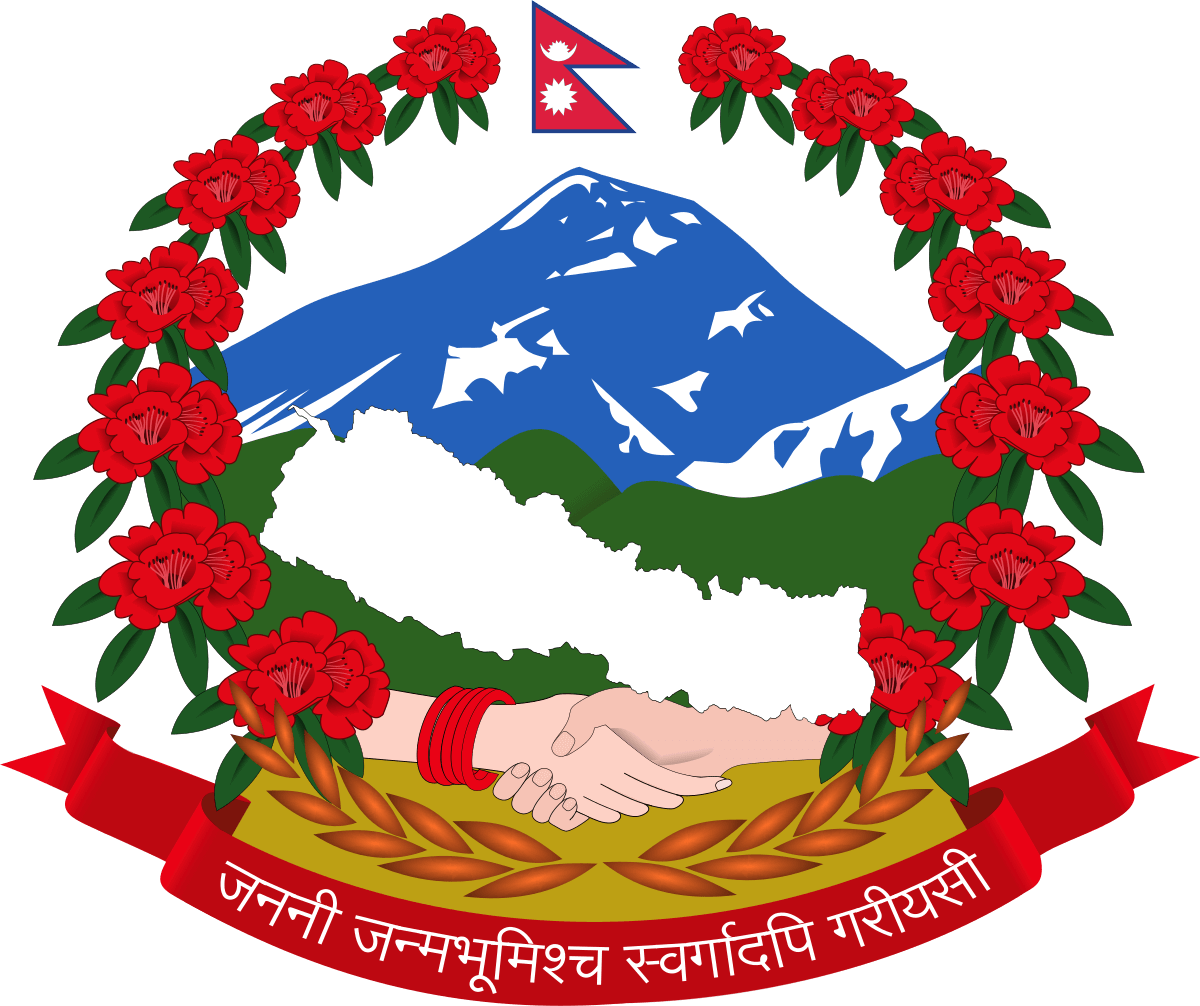Introduction

The National Women Commission was established on March 7, 2002, according to the decision of the Council of Ministers. After the promulgation of the Constitution of Nepal in September 2015, NWC received constitutional recognition. The National Women Commission Act (2017) and Regulations (2021) further strengthened the legality of the Commission and shaped a defined role, responsibilities and mechanism. The Commission intends to empower women by protecting and promoting the rights, interests, and entitlements of all Nepali women, ensuring gender justice all over the nation by eliminating all forms of discrimination against women. According to the Constitution, the Commission withholds the right to examine the policies and programmes in regard to the rights of women and set forth recommendations for its implementation to the government. It also needs to correlate the domestic laws viz-a-viz international charters, conventions and treaties that Nepal is a state party to. Investigating and reviewing the implementation of the state obligation as laid out by such international instruments also falls under the responsibility of the Commission. Similarly, it is also mandated to recommend the government while producing country reports on issues relating to women rights pursuant to the international treaties and agreements. The Commission also reserves the right to recommend the government by reviewing any existing laws and policies concerning women issues and interests. Furthermore, in case of any legal remedy is required, the Commission can suggest concerned authorities towards such actions. In order to promote and protect the rights of women and eliminate all kinds of gender inequalities, the Commission has been developing and implementing various programmes. One of the programmes that have been playing a pivotal role in providing emergency relief to gender-based violence (GBV) survivors is the operation of the “Let’s report to 1145 helpline” service. 1145 is a toll-free hotline number, open 24 hours a day and seven days a week. This hotline number has been operated by the Commission for the last four years as an emergency contact to report and register any type of violence against women. Apart from the hotline, the Commission receives complaints regarding any violation of women rights through any medium convenient to the complainant–whether online, phone, SMS or physical visit to the Commission. The identity of the complainant is always kept confidential while also ensuring their physical and emotional safety. After reviewing the complaints, the Commission provides different services as required by the individual cases–ranging from psycho-social counselling, legal assistance, providing safe house service to the necessitous GBV survivors, and bringing the issue forth to the concerned government authorities for appropriate action. Besides, the Commission regularly publishes various information resources to raise awareness about the rights and entitlements of women as enshrined by the national and international laws. The publications such as status reports, implementation review reports, a compilation of rights set down for the Nepali women in a multitude of sectors, are available in various forms such as books, brochures, booklets and leaflets. These publications shed light on many different areas, making the citizens aware of the rights of women, and at the same time, holding the government accountable for the implementation of said rights as laid out by the constitution of Nepal. In addition to the basic informational publications, the Commission also conducts research on the status of women in various sectors, issues and areas. As the issue of women rights is as much socio-cultural as it is political and legal, the Commission believes in investigating the covert discrimination against women and its impact on the full realisation of women rights. These researches have been instrumental in examining the deep-rooted issues within the broader Nepali society, and hence its manifestation in the political and legal arena. Based on the findings of these researches, the Commission provides policy inputs to the government and other concerned authorities for necessary intervention. The Commission is working towards building a robust foundation for the upliftment of the rights and interests of women through various emergency, legal and psycho-social means. Following a zero-tolerance policy towards violence against women, the Commission stands as a watchdog for the protection and promotion of women's rights, gender equality and empowerment through advisory, executive and judicial assistance functions. Through these programmes and activities, the Commission is committed to establishing a gender-equitable society, where all forms of violence and discrimination against women and girls have been addressed. The Commission is eager to facilitate such an environment in which women reserve equal and substantive participation in achieving sustainable development on all fronts, and ultimately in nation-building.
The Commission has declared the rights of women as per the Constitution of Nepal and the National Commission for Women Act, 2074 BS, To formulate policies and programs related to the interests and submit them to the Government of Nepal for implementation, To monitor the implementation of the law related to women's rights and obligations under the international treaty or agreement with Nepal and to suggest to the government for its effective implementation, In order to include women in the mainstream of national development and to ensure proportional participation in all state bodies, it has been reviewing the existing policies and programs and making recommendations for effective implementation. Similarly, gender equality, Study of women empowerment and legal system related to women, To make recommendations to the concerned bodies regarding research and improvement, It has also been making suggestions to the Government of Nepal regarding the preparation of the report to be sent by Nepal in accordance with the provisions of the international treaty or agreement with Nepal related to women's rights. If there is a need to file a case against any person or organization for being a victim of violence against women or social evils or for not allowing or depriving women of their rights, the commission has been recommending to file a case in the court as per the law.
The commission has been working for the last four years ''Let's report to 1145 helpline'' It has been playing a coordinating role in providing immediate relief to the women and children who have been subjected to sexual violence across the country by providing services, providing necessary legal assistance to the victims to punish the perpetrators according to the prevailing law and providing psychosocial counseling and safe shelter to the victims. Thus, the commission has been hearing complaints of incidents of gender-based violence across the country and providing necessary assistance to the victims. The role of the Commission in reducing violence against women and children is very important. The Commission has also been playing the role of mediator in sending helpless women and children to various shelters for the protection of the homeless and in case of reconciliation between the victims and the perpetrators through mutual discussion. Thus, the Commission is acting as a bridge between the women and children victims of violence seeking help and the social organizations providing assistance. Today, the National Commission for Women has been established as a center of hope and relief for thousands of exploited, victimized and abused women. The helpline service was provided in the fiscal year 2078/Since 1979, necessary arrangements have been made to operate from the budget and manpower of the Government of Nepal.
The Constitution of Nepal states that the National Commission for Women may establish its office in the state as required. In view of the increasing number of complaints of sexual violence in the Commission and the increasing number of women and children victims of violence seeking various services through the Commission's helpline, preliminary homework has been started to establish and operate the Commission's state level office. The Commission's office in Kathmandu is currently coordinating to hear the complaints of violence victims across the country and provide relief and various services to them. The opening of the office at the state level is expected to help address the incidents of gender-based violence at the state and local levels. This will save time and cost for the victims to travel to Kathmandu in search of justice and will help them to provide fast and low cost judicial services at the state level.
Constitution of Nepal and National Commission for Women Act, The Commission for the Control and Prevention of Gender Based Violence is implementing all the three preventive, promotional and therapeutic programs simultaneously as directed by 2074 BS. The Commission has been continuously informing and alerting the local people's representatives and other stakeholders with the objective of raising awareness on the issue of women's rights at the state and local level and controlling and eradicating discriminatory practices and social norms against women. Violence against women by the Commission, It has been conducting training programs on discrimination nationwide and also conducting various awareness activities with the objective of raising awareness against violence against women at school level. In order to spread information about women's rights and raise public awareness against gender based violence, it has been conducting regular programs on radio and FM as well as producing and publishing various propaganda materials.
Thus, the National Commission for Women, acting as a constitutional commission in the field of protection and promotion of women's rights, gender equality and empowerment and control of gender based violence, has been fulfilling important responsibilities such as providing advisory, executive and judicial assistance. The Commission warns to prevent the violation of women's rights in the country and to control gender based violence (Watch Dog).


